Translated by Liza Thomas
——————————————-
The morning of Day 3, that is May 7, 2019, dawned on us with some residual problems from Day 1, and Day 2 including those created by OYO. The third day’s plan was to cross Sengottai mountain-pass into Tamilnadu and spend the night there. I was supposed to meet a few people at the Thiruvananthapuram Secretariat in connection with GIE, and with that in mind, we decided to start the journey after 9 AM. However, the meetings at the Secretariat did not materialise. At 11 AM, we left Thiruvananthapuram via Nedumangad and Kulathupuzha towards Sengottai.
We stopped a bit before Kulathupuzha to fill up our vehicle’s windshield washer and stock up on drinking water. The shopkeeper warned us that our route was in very bad condition for the next 20 odd kilometres due to having been dug up for road expansion work. And the drive proved to be very uncomfortable and tiring. It would have caused a lot less inconvenience to break up one half of the road, rebuild it, and then dismantle the rest.
Once we had left that difficult stretch of the road, our hunger lead us to a small wayside eatery whose sign advertised ‘Naadan (local) food’. We sat down to a sumptuous meal of rice, accompanied by fried and curried fish, three types of stir-fried vegetables, tapioca, papads, various traditional curries, pickles and beef. The description Naadan food was spot on. And the bill did not burn a hole in our pocket either. It really was my first satisfying meal after leaving home four days ago. If you have a chance to travel via Onthupacha, do give this place a shot.
The onward drive from Onthupacha, on good roads and without heavy traffic, was really enjoyable. We suddenly noticed a couple stopping their motorbike by the roadside and immediately being surrounded by macaque monkeys. We stopped our vehicle a bit further down the road and observed them – they were feeding the animals. Once they were done, we approached them.

The couple, Madasamy and Karpagaselvi, are Tamilians residing in Thiruvananthapuram. They earn their livelihood selling roasted groundnuts from a cart. A few times a month, on their way to Tamil Nadu, they stop here to feed the monkeys. They usually feed them up to 20 packages of nuts. And even when they offer the groundnuts in the palms of their hands, the monkeys do not accost them. They have a young differently-abled daughter who sometimes accompanies them on these trips, and the monkeys do not trouble her in any way when she offers them groundnuts in this manner. According to Madasamy, the only thing you need to be cautious about is not to withdraw the feeding hand suddenly as this can anger the wild animals..

I decided to give it a try. Just before exiting the mountain-pass, we came across another troop of monkeys, including a lot of monkey moms and their clinging offspring. Usually, travellers who feed monkeys are afraid of them – and tend to throw food towards them. However, when I offered biscuits in the palm of my hand, one of the monkeys calmly picked them up and ate them. It did not seem to have any inclination to attack me, and in fact appeared scared of being attacked – man is known to be the most vicious of animals after all!
This pass across the ghats boasts of merely two hairpin turns. The rest of the route is a gradual ascent. There are no indications of a steep climb. At the top of the hill, we found signage for Shendurney Boating – which is part of the Thenmala Eco-Tourism project. These boat cruises take place in the reservoir of Pallamvetti Saddle Dam. Coracles, bamboo rafts, and boats are available for cruising. Regular cameras are prohibited, but mobile phone cameras are allowed. We moved forward after taking a few pictures and some video on our mobile.
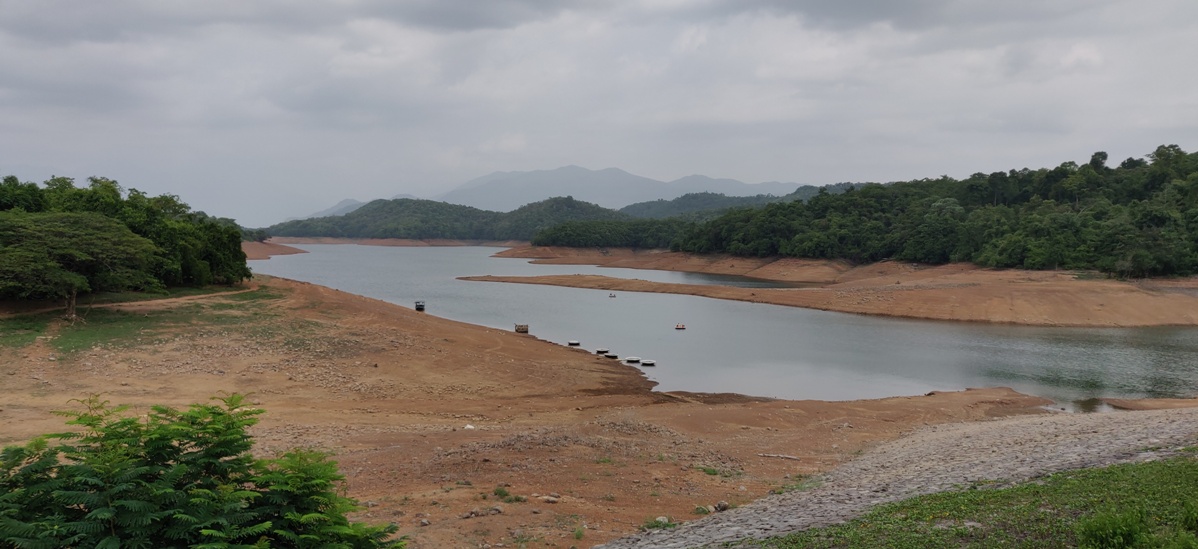
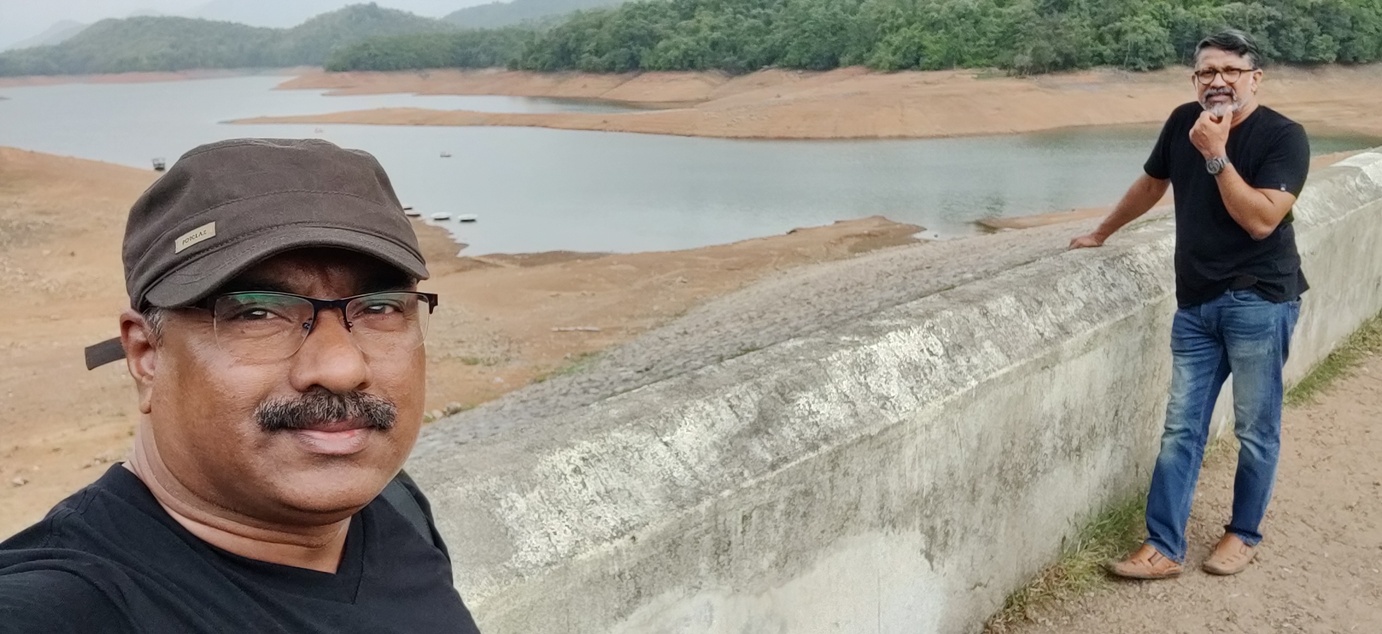
Parappar Dam in Thenmala is also off limits for cameras. So we decided to postpone further exploration until GIE.
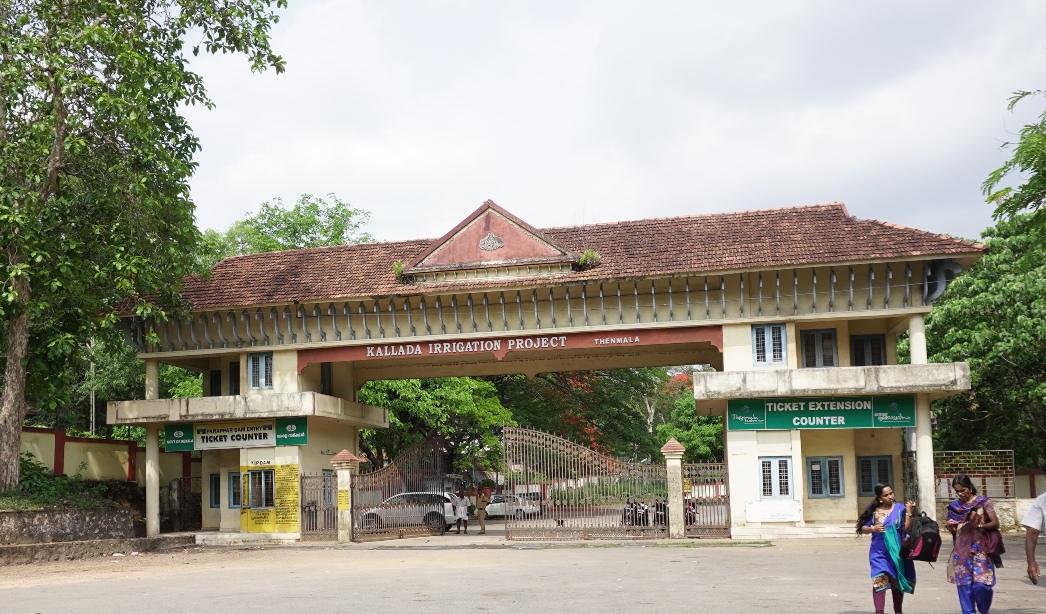
Paalaruvi falls was merely 15 kilometres away, but since we had previously decided not to deviate much from the ghats during the trial, this point of interest has been planned for inclusion in the {HYPERLINK} Great Indian Expedition.
One of the significant sights on this route is the Punalur-Sengottai railway line – which towers high on stone arches on the left side of the road. I had earlier seen pictures of it, and now I finally came face to face with it. We parked the car and happen to see a group of photographers busy at work, posing a newly married couple for their post wedding shoot. Quite obviously they had just been married at Aryankavu or thereabouts. One of the Cameramen – Sunil from Punalur – told us that that it was quite common for groups of photographers from places like Punalur, Kollam and even far away Thiruvananthapuram, to descend on the area with newly married couples in tow. Apparently the backdrop of these majestic arches are a favourite location for post wedding photo shoots.
The Punalur-Sengottai railway line was a metre-gauge line until recently. In fact, it was the last remaining metre-gauge line in Kerala. When the conversion to broad gauge was made, the old bridge and the supporting arches had to be expanded. The new arches were actually built around the existing ones. The original arches are still there, enclosed within new façades, faithfully doing their intended job, more than a century later. Bowing to the demand for maintaining antiquity, the new pillars were given a chiselled granite appearance.
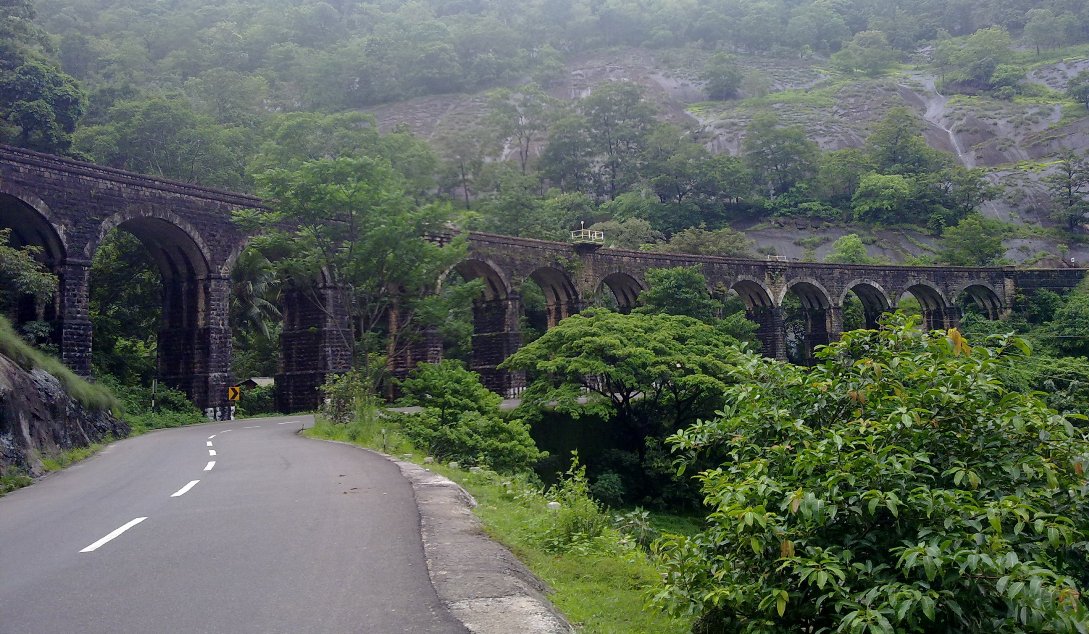
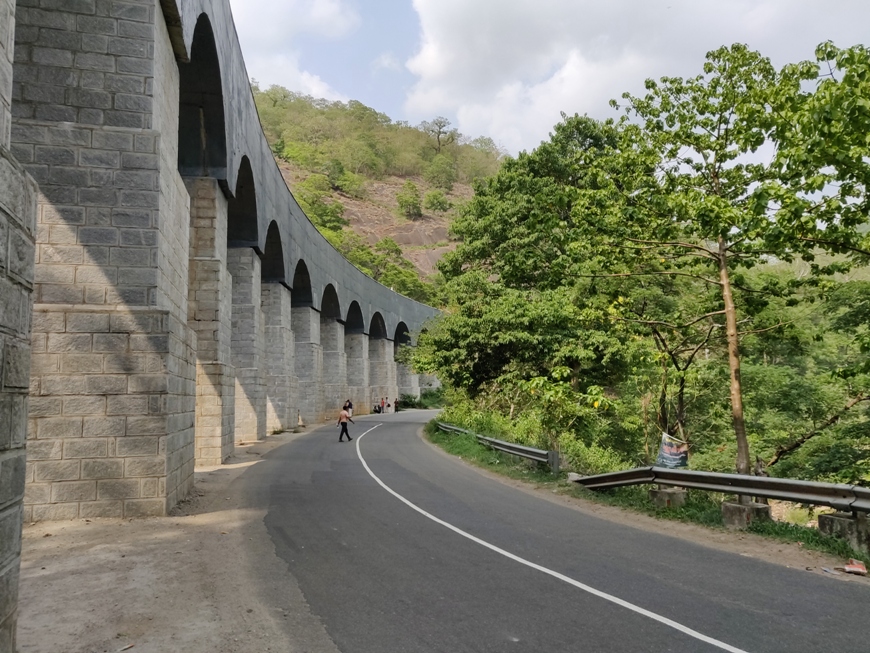
To facilitate gauge conversion work, metre gauge train services were suspended in 2006. While broad gauge services from Kollam to Punalur commenced in 2010, the Punalur to Sengottai stretch was completed only in 2018. This route includes 200 bridges, 5 tunnels, 5 overbridges and 5 railway crossings. Work on this railway line commenced on November 24, 1904, and took 21 years to finish. The Punalur-Sengottai line excites travellers and train hobbyists to this day. However local vendors based under the bridge say that there used to be a train every hour when the line was metre-gauge, while now there are hardly 4-5 in a day.
As we descended the mountain-pass, we had a beautiful bird’s-eye-view of Sengottai town and its surroundings. In the distance we could also spot some wind turbines spinning away on some unknown wind-farm.
For the first time since we started our journey, we called it a day at 5:00 PM. We had booked a room at Santhanam’s Villa, Kutralam, through the same OYO app that had let us down the previous day. They promised to refund the money we lost, within 2 weeks. However the two hours we wasted due to the non existent hotel booking were a huge loss.
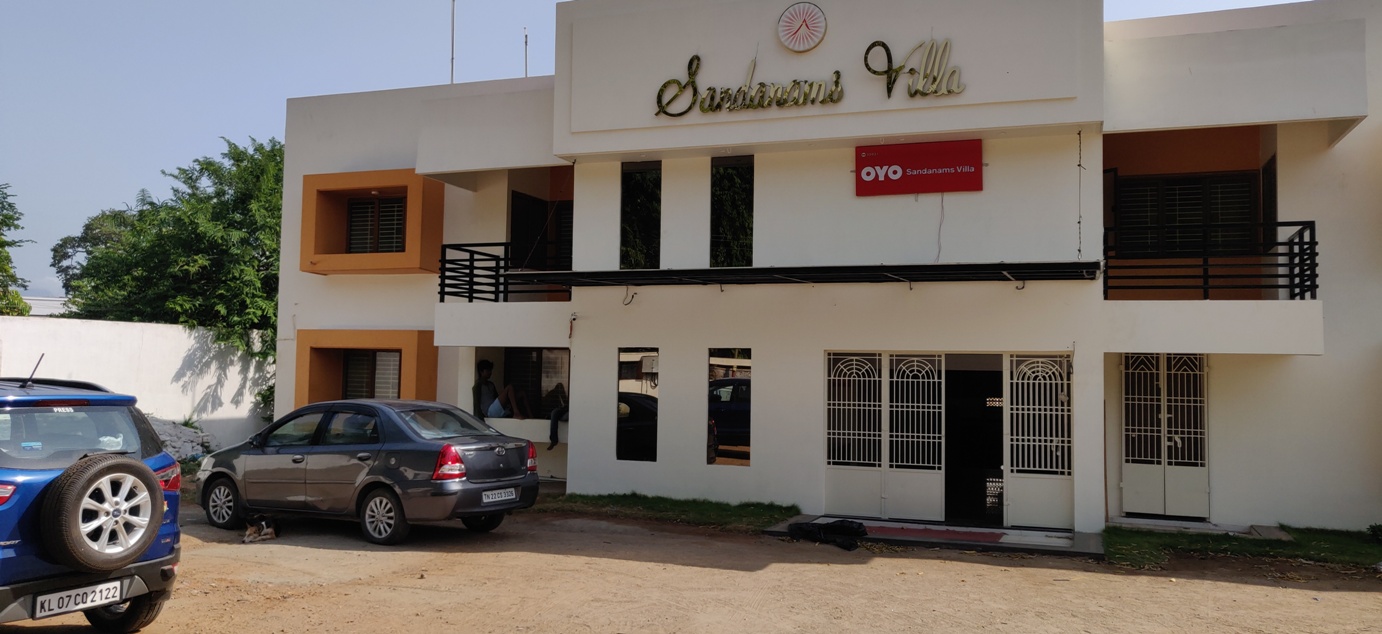
Santhanam’s Villa offered facility for air drying washed clothes – and the steady breezes of Kutralam would do the rest. What better opportunity to clean the 4 days’ worth of dirty clothes from our journey. I got some detergent, and soaked all my clothes in soapy water.
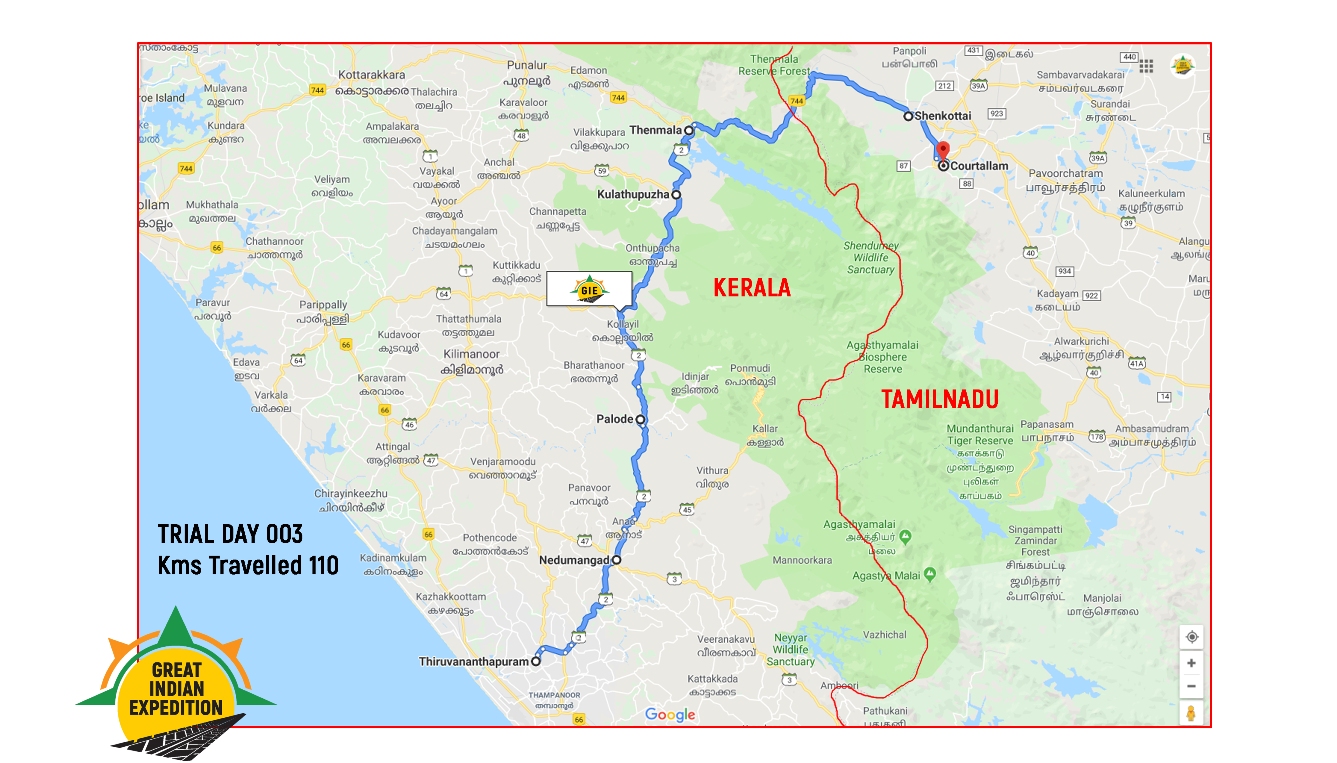
Dinner was from a vegetarian restaurant near the Bus Stand. Back in the room, Johar dived into video editing. I washed my clothes, hung them up to dry, and sat down in front of my computer. Though it was only 11:00 PM, sleep was already beckoning me. Deciding to finish the travelogue the next morning, I closed the laptop and brought Day 3 to a close.
Edited by Nishad Kaippally
——————————————
To read the next part of this travelogue click here.
To view the You Tube video of this travelogue, click here.
To read the original Malayalam text of this travelogue, click here.
To hear the Malayalam sound track of this travelogue, click here.